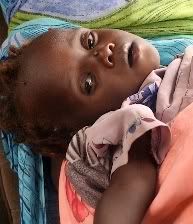
I have not eaten now for over 48 hours due to sickness and diarrhoea. It has left me feeling exhausted and extremely grumpy - those around me would confirm this in an instant. I have been taking antibiotics and drinking plenty of water and flat cola, none of which seems to be having any positive effect with my stomach still feeling like it holds bubbling toxic lava.
It has been a more than unpleasant past two days, yet as much as I have complained, I feel I am in no position to do so.
Chronic sickness and diarrhoea is a common problem in Darfur, especially in the camps for IDPs (internally displaced people).
Aid workers here speculate that in some camps as many as one in five children suffer from sickness and diarrhoea at any one time. They focus on the children because for them diarrhoea in these conditions can be a very serious problem.
It means children are left even more weak and vulnerable than they would be usually - what little nutrition they are getting, their meagre bodies are not absorbing.
In Camp Al-Salaam, just outside Nyala, South Darfur, eight children were reported to have died from chronic diarrhoea within the last month.
On a recent visit to Camp Otash, also on the outskirts of Nyala, the dangers of diarrhoea became only too apparent.
I came across a little boy named Hawa Abdullah. Hawa (pictured here) is six years old but could well pass for much younger. When I met him his wrists were, without exaggeration, as thin as my thumb. His skin hung off his arms, so flaccid it seemed as though he had no muscle at all.
The mass of flies swarming around his face didn't bother him. He barely moved, could barely breathe and was so exhausted he could hardly keep his eyes from shutting. His body just hung in his mother's arms.
His sickness meant he was severely malnourished. He had been eating - not much, but enough to keep a child of his age alive. The problem was that everything was going straight through him.
Had he not been found by aid workers, I have no doubt he would now be dead.
"I wonder how many other Hawas there are out there?" one aid worker remarked to me as the boy was taken off for further treatment.
Of the 2.5 million people uprooted by the conflict in Darfur around 700,000 are estimated to be children. But any speculation of the percentage with sickness and diarrhoea would be nothing but a wild guess.
Bugging me right now isn't just how many children are ill, but also how many will get the treatment they need to survive.

No comments:
Post a Comment